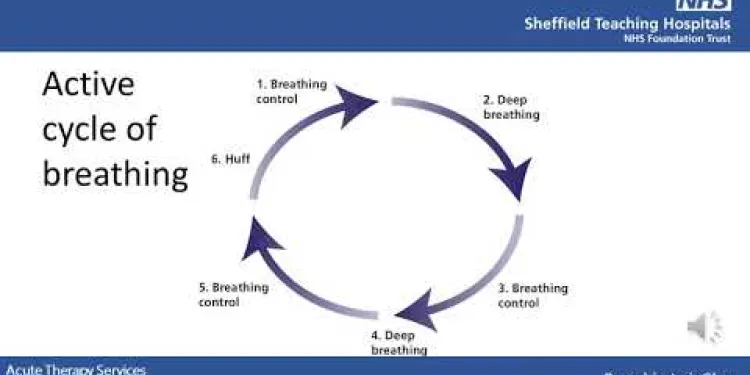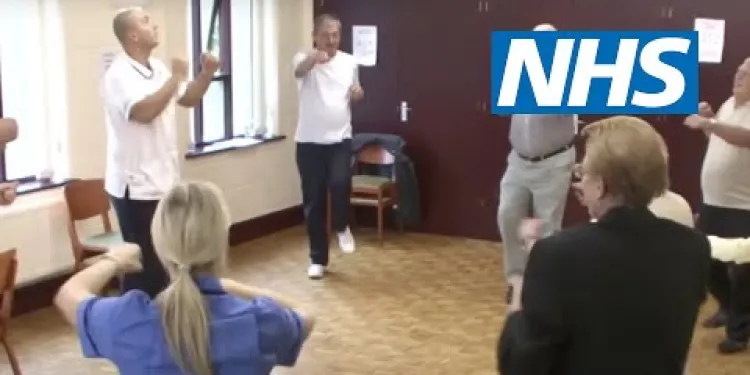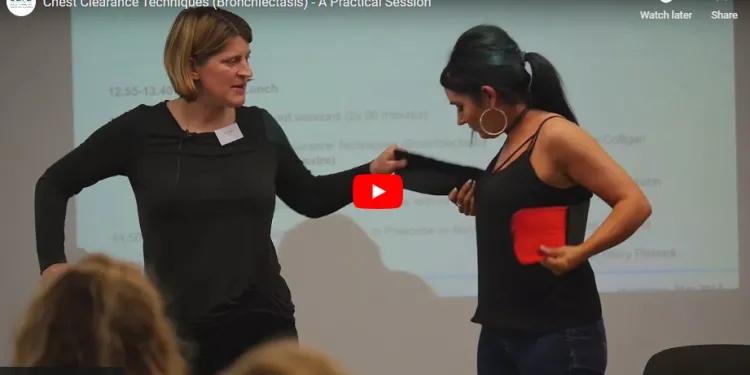Find Help
More Items From Ergsy search
-

Bronchiectasis Class
Relevance: 100%
-

Bronchiectasis class presentation v2
Relevance: 94%
-

Pulmonary rehabilitation | NHS
Relevance: 20%
-

Chest clearance techniques
Relevance: 19%
-

How often should one perform air physiotherapy?
Relevance: 13%
-

What equipment is used in air physiotherapy?
Relevance: 12%
-

NHSGGC - Respiratory Physiotherapy Service: Self-Management
Relevance: 7%
Bronchiectasis: An Overview
Bronchiectasis is a chronic condition characterized by the permanent enlargement of parts of the airways in the lung. This disease leads to excessive mucus production and frequent infections, making it an important health concern. Understanding its causes, symptoms, and management is crucial for effective care and improved quality of life.
Causes of Bronchiectasis
Bronchiectasis can result from a variety of factors, including repeated lung infections, such as pneumonia and tuberculosis, which damage the bronchial walls. Genetic conditions like Cystic Fibrosis and Primary Ciliary Dyskinesia also contribute, as well as autoimmune diseases and immune system deficiencies. Environmental factors, including exposure to harmful substances, may further exacerbate the condition.
Symptoms
The symptoms of Bronchiectasis can vary in severity but commonly include a persistent cough that produces large amounts of phlegm, shortness of breath, chest pain, and frequent chest infections. Over time, the condition can lead to more severe respiratory problems and reduce a person's ability to perform everyday activities.
Diagnosis
Diagnosing Bronchiectasis typically involves a combination of clinical examination, imaging techniques like High-Resolution CT (HRCT) scans, and pulmonary function tests. Sputum analysis and blood tests may also be conducted to identify underlying infections or other contributing factors.
Treatment Options
Treatment is aimed at controlling symptoms and preventing further lung damage. This includes airway clearance techniques, like chest physiotherapy, and medications such as antibiotics for infections, bronchodilators, and anti-inflammatory drugs. In severe cases, surgery may be considered to remove damaged parts of the lung.
Lifestyle and Management
Living with Bronchiectasis requires ongoing management to maintain respiratory health. Patients are advised to quit smoking, stay hydrated, exercise regularly, and have vaccinations to prevent infections. Managing coexisting health conditions and regular medical check-ups are also vital.
Support and Resources in the UK
In the United Kingdom, several resources and support groups, such as the British Lung Foundation, provide valuable information and support. Specialist respiratory clinics across the NHS offer expert advice and treatment plans tailored to individual needs. Awareness and education initiatives are crucial in helping patients and families cope with Bronchiectasis.
Bronchiectasis: An Overview
Bronchiectasis is a long-term illness that affects the lungs. It happens when parts of the tubes inside the lungs get bigger and produce too much mucus. This can cause chest infections. Knowing about its causes, signs, and treatment is important to feel better and make life easier.
Causes of Bronchiectasis
Bronchiectasis can be caused by different things. These include having lung infections like pneumonia and tuberculosis many times. Some people are born with conditions like Cystic Fibrosis that can cause it. Problems with the body's defense system and bad environmental factors also play a role.
Symptoms
The signs of Bronchiectasis can be different for each person. Common signs are coughing a lot with lots of mucus, feeling short of breath, having chest pain, and getting chest infections often. If it gets worse, it can affect normal activities.
Diagnosis
To find out if someone has Bronchiectasis, doctors look at them, take special pictures of their lungs, and do tests to check how well the lungs work. They might also test mucus or blood to find causes of infections.
Treatment Options
The aim of treatment is to help with symptoms and stop more lung damage. Treatments include exercises to clear mucus, medicines like antibiotics for infections, drugs to open airways, and drugs to reduce swelling. In very bad cases, surgery might be needed to take out damaged lung parts.
Lifestyle and Management
Living with Bronchiectasis means you need to look after your chest. It is important not to smoke, to drink lots of water, exercise often, and get vaccines to stop infections. Regular health check-ups help too.
Support and Resources in the UK
In the UK, places like the British Lung Foundation offer help and information. There are special clinics in the NHS where experts can give advice and make treatment plans just for you. Learning about Bronchiectasis helps people and families manage better.
Frequently Asked Questions
What is bronchiectasis?
Bronchiectasis is a long-term condition where the airways of the lungs become abnormally widened, leading to a build-up of excess mucus that can make the lungs more vulnerable to infection.
What are the main symptoms of bronchiectasis?
The main symptoms include a persistent cough that brings up phlegm, breathlessness, recurrent chest infections, and frequent production of sputum.
What causes bronchiectasis?
Common causes include severe lung infections such as pneumonia or tuberculosis, whooping cough, and childhood infections. It can also be linked to underlying health conditions such as cystic fibrosis or immune system disorders.
How is bronchiectasis diagnosed?
Bronchiectasis is typically diagnosed through a combination of patient history, physical examination, chest X-rays, CT scans, lung function tests, and sometimes sputum samples.
Can bronchiectasis be cured?
There is currently no cure for bronchiectasis, but treatments can help manage the condition by relieving symptoms, improving lung function, and preventing complications.
What treatments are available for bronchiectasis?
Treatments include airway clearance techniques, medications such as antibiotics, bronchodilators, and sometimes surgery in severe cases. Regular physiotherapy and exercise are also beneficial.
How can I prevent infections if I have bronchiectasis?
Preventative measures include regular hand washing, vaccinations, avoiding smoke and pollutants, maintaining good hydration, and following prescribed treatments to keep the airways clear.
Is bronchiectasis a common condition in the UK?
Bronchiectasis is relatively uncommon but has been increasing in prevalence. Estimates suggest that around 1 in 1,000 adults in the UK are affected.
What lifestyle changes can help manage bronchiectasis?
Quitting smoking, maintaining good nutrition, staying hydrated, exercising regularly, and practising good airway clearance techniques can significantly help manage symptoms.
How often should someone with bronchiectasis visit their healthcare provider?
Regular follow-ups are important. The frequency can vary, but it is often recommended to see a healthcare provider at least every 6-12 months or when symptoms worsen.
Can children develop bronchiectasis?
Yes, children can develop bronchiectasis, especially if they have conditions like cystic fibrosis or have had severe lung infections during early childhood.
Is bronchiectasis contagious?
No, bronchiectasis itself is not contagious. However, infections that can occur as a result of the condition can be contagious.
How does bronchiectasis affect daily life?
It can make daily activities more challenging due to symptoms like chronic cough, fatigue, and breathlessness, but with proper management, many people can lead active and fulfilling lives.
Are there support groups for people with bronchiectasis in the UK?
Yes, there are several support groups and organisations, such as the British Lung Foundation, that provide resources and support for those living with bronchiectasis.
What should I do if I have a flare-up of bronchiectasis symptoms?
If you experience a flare-up, it is important to follow your prescribed treatment plan, contact your healthcare provider, and seek medical attention if symptoms worsen significantly.
What is bronchiectasis?
Bronchiectasis is a big word that means your lungs are sick.
Inside your lungs, there are tiny tubes. These tubes help you breathe.
When someone has bronchiectasis, these tubes get damaged.
The tubes can get swollen and make a lot of sticky stuff called mucus.
This makes it hard to breathe.
How to help:
- If you feel tired or short of breath, tell a doctor.
- Breathe in steam from hot water (like a hot shower) to help your chest.
- Drinking lots of water can make mucus thinner so it's easier to cough up.
Bronchiectasis is a problem you can have for a long time. It happens when the tubes in your lungs get too big. This makes sticky stuff, called mucus, build up in your lungs. When this happens, it is easier for you to get infections.
What are the main signs of bronchiectasis?
Bronchiectasis is a lung problem. It means the lungs have trouble. Here are some signs that someone might have bronchiectasis:
- You might cough a lot.
- Sometimes, stuff comes up when you cough.
- You might feel out of breath.
- You could feel tired more than usual.
If you think you have these signs, tell a grown-up or a doctor. They can help check if it is bronchiectasis. Pictures and videos about lungs can also help you understand better.
The main signs you might notice are a cough that doesn’t go away and makes you spit out thick stuff. You might also find it hard to breathe, get chest infections often, and have lots of mucus.
What makes people get bronchiectasis?
Doctors are not always sure why someone gets bronchiectasis. But sometimes it happens because:
- You had a bad chest infection when you were little.
- You have a problem with your lungs called cystic fibrosis.
- Your body finds it hard to fight germs. This is called a weak immune system.
- You breathed in something that hurt your lungs, like fumes or food.
If you want to know more, you can:
- Ask your doctor questions.
- Look at pictures of lungs to help you understand.
- Use simple word books or apps to learn new words.
These problems can happen because of big lung sicknesses like pneumonia or tuberculosis. Other causes are whooping cough and childhood sicknesses. Sometimes, it is because of other health problems like cystic fibrosis or issues with the immune system.
How do doctors find out if someone has bronchiectasis?
Doctors use tests to see if someone has bronchiectasis. Here are some things they might do:
- Talk and Listen: The doctor will ask questions about coughs and breathing.
- Look at X-rays: Pictures of the chest help doctors see inside the lungs.
- CT Scan: This is a special kind of X-ray that gives more details.
- Breathing Tests: These tests show how well the lungs work.
If it's hard to understand, ask someone you trust to explain. You can also use pictures or videos to help you learn.
Doctors find out if you have bronchiectasis by doing different tests. They will ask you questions about your health. They will check your body. They might take pictures of your chest using an X-ray or a CT scan. They will check how well your lungs work. Sometimes, they might need a small bit of spit (called sputum) to test it.
Can we fix bronchiectasis completely?
Bronchiectasis is a sickness that hurts people’s lungs. It makes breathing hard.
Right now, doctors cannot fix bronchiectasis completely. But they can help you feel better with medicine and exercises.
It is important to see your doctor and follow their advice. They will give you the best treatment to make you feel better.
Some helpful things you can do include:
- Take your medicine each day.
- Do breathing exercises. They help your lungs work better.
- Keep away from smoky or dusty places.
Right now, we can't completely fix bronchiectasis, but we have ways to help. These can make you feel better, help your lungs work well, and stop other problems from happening.
What are the treatments for bronchiectasis?
Bronchiectasis is a condition that affects the lungs.
Here are treatments that can help:
- Medicines: Doctors may give you medicine to help with breathing and to stop infections.
- Chest Physiotherapy: Special exercises can help clear mucus from the lungs.
- Breathing Devices: Some machines can help make breathing easier.
- Healthy Habits: Eating well and staying active can make you feel better.
- Regular Check-ups: Visit the doctor regularly to keep track of your health.
If you need help understanding or remembering treatments, you can:
- Ask a family member or friend to come to appointments with you.
- Write down questions before going to the doctor.
- Use videos and pictures to learn more about treatments.
Doctors can help in different ways. They help you clear your airways, which are the paths air travels through. They give you medicine to fight germs, help you breathe better, and sometimes you might need an operation. Doing exercises and seeing a special doctor called a physiotherapist can make you feel better too.
How can I stop getting infections if I have bronchiectasis?
Here are some ways to stay healthy:
- Wash your hands often.
- Get your vaccines (shots that stop you from getting sick).
- Stay away from smoke and dirty air.
- Drink lots of water.
- Take your medicine if the doctor gives it to you.
These things help keep your lungs and breathing healthy.
Is bronchiectasis common in the UK?
Bronchiectasis is a lung problem. It makes it hard to breathe.
In the UK, it is not very common.
Ask a doctor if you have questions. You can also use pictures or videos to help understand better.
Not many people have bronchiectasis, but more people are getting it. About 1 out of every 1,000 grown-ups in the UK has it.
What can you do to help with bronchiectasis?
Here are some simple things you can do:
- Eat healthy food: Try to eat fruits, vegetables, and good proteins like chicken or beans.
- Exercise: Moving your body with daily walks or playing outside can help.
- Stay away from smoke: Smoking or being around smoke can make your lungs feel worse.
- Rest well: Make sure you get plenty of sleep at night.
If you or a loved one have trouble understanding this information, you might find these helpful:
- Ask a friend or adult to explain things to you.
- Draw pictures or make a list to help remember.
- Use a calendar to track your daily habits.
Stopping smoking, eating healthy food, drinking lots of water, moving your body often, and keeping your airways clear can help you feel better.
How often should someone with lung problems see their doctor?
If you have lung problems like bronchiectasis, it's good to see your doctor a lot.
Your doctor will tell you how many times you should visit.
Here are some tips to help:
- Make a calendar to remember your doctor visits.
- Ask a friend or family to help you go.
- Write down how you feel, to tell the doctor.
It is important to have regular check-ups. How often you go can change, but it's usually a good idea to see your doctor every 6 to 12 months. You should also go if you start to feel worse.
Can kids get bronchiectasis?
Yes, kids can get bronchiectasis. Bronchiectasis is a problem with the lungs. It can make it hard to breathe.
If a kid has a cough that doesn't go away or has trouble breathing, they should see a doctor.
Doctors can help find out if it's bronchiectasis and help kids feel better.
Tools that might help:
- Talk to a friendly doctor who helps kids.
- Read kids' books about the lungs and breathing.
- Play breathing games, like blowing bubbles, to make lungs strong.
Yes, kids can get a sickness called bronchiectasis. This can happen if they have cystic fibrosis or if they had bad lung infections when they were young.
Can you catch bronchiectasis from someone?
No, you cannot catch bronchiectasis from another person. It is not a disease you can get from others. Bronchiectasis happens when the airways in your lungs get wider and can be caused by infections or other lung problems.
If you want to learn more about it, you can use pictures or videos to help understand. You can also ask an adult or a doctor to explain it to you.
Bronchiectasis is an illness. You can't catch it from someone else. But if a person with bronchiectasis has an infection, the infection might spread to others.
How does bronchiectasis affect daily life?
Bronchiectasis is when your lungs don't work as well as they should. It can make it hard to breathe and cause coughing. This can make daily activities tougher.
Here are some things you can do to feel better:
- Get help from a doctor.
- Use medicine that helps you breathe easier.
- Do exercises to make your lungs stronger. A doctor can show you how.
- Eat healthy food and drink lots of water.
If you find reading or learning about this hard, you can ask a family member, friend, or a healthcare worker to help you understand.
Daily activities can be harder because of problems like a long-lasting cough, feeling very tired, and having trouble breathing. But with the right help, many people can still do fun and active things.
Can I join a support group in the UK if I have bronchiectasis?
If you have bronchiectasis, you can join a support group. There are people in the UK who meet and talk about living with this illness. They can help you feel better and share tips.
If you want to find a group, you can ask a nurse or doctor to help you. You can also look on the internet for groups like the 'British Lung Foundation'. They help people with lung problems.
Yes, there are groups that can help. One group is the British Lung Foundation. They give help and information to people with bronchiectasis.
What to Do If My Bronchiectasis Gets Worse
- **Notice Your Breathing:** Pay attention. Is it hard to breathe? - **Look for Mucus:** Is there more mucus? Is it a different color? - **Feel for Pain:** Does your chest hurt? - **Get Help:** Tell an adult like a parent, teacher, or carer. **Ask a Doctor or Nurse for Advice:** - **Call Them:** Use the phone to ask about your health. - **Tell Them How You Feel:** Share all the changes in your symptoms. **Do Things That Help:** - **Rest:** Get lots of sleep. - **Drink Water:** Water can help your body feel better. - **Do Deep Breathing Exercises:** These exercises can make breathing easier. **Remember:** - **Keep Emergency Contacts Handy:** Know how to call for help if needed.If you feel sick again, it's important to follow your doctor's plan. Call your doctor if you need help, or if you feel much worse, go see them.
Useful Links
This website offers general information and is not a substitute for professional advice.
Always seek guidance from qualified professionals.
If you have any medical concerns or need urgent help, contact a healthcare professional or emergency services immediately.
Some of this content was generated with AI assistance. We’ve done our best to keep it accurate, helpful, and human-friendly.
- Ergsy carfully checks the information in the videos we provide here.
- Videos shown by Youtube after a video has completed, have NOT been reviewed by ERGSY.
- To view, click the arrow in centre of video.
- Most of the videos you find here will have subtitles and/or closed captions available.
- You may need to turn these on, and choose your preferred language.
- Go to the video you'd like to watch.
- If closed captions (CC) are available, settings will be visible on the bottom right of the video player.
- To turn on Captions, click settings .
- To turn off Captions, click settings again.
More Items From Ergsy search
-

Bronchiectasis Class
Relevance: 100%
-

Bronchiectasis class presentation v2
Relevance: 94%
-

Pulmonary rehabilitation | NHS
Relevance: 20%
-

Chest clearance techniques
Relevance: 19%
-

How often should one perform air physiotherapy?
Relevance: 13%
-

What equipment is used in air physiotherapy?
Relevance: 12%
-

NHSGGC - Respiratory Physiotherapy Service: Self-Management
Relevance: 7%

